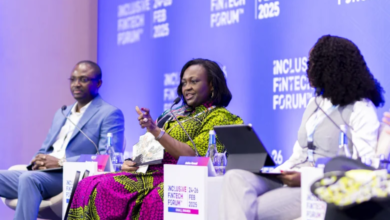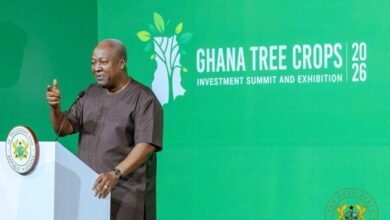Dr. Akinwumi A. Adesina « Africa must not be a museum of poverty »
Africa is being pummeled by climate change. Just last week, hundreds of people died in KwaZulu Natal due to floods. Also, rising temperatures are scorching farms across the continent. Sub-Sahara Africa climate adaption needs are estimated at $331 billion. In addition, the rising challenges of the war in Ukraine, have created even more challenges, and a looming food crisis. There is every reason to be very concerned!*
Africa is being pummeled by climate change. Just last week, hundreds of people died in KwaZulu Natal due to floods. Permit me to use this opportunity to extend our condolences and sympathies to the people and Government of South Africa.
Also, rising temperatures are scorching farms across the continent.
« Sub-Sahara Africa climate adaption needs are estimated at $331 billion »
Sub-Sahara Africa climate adaption needs are estimated at $331 billion. In addition, the rising challenges of the war in Ukraine, have created even more challenges, and a looming food crisis.
There is every reason to be very concerned!
The price of wheat has soared by over 60%, and in Africa by an average of 45%. The cost of bread is now beyond the reach many Africans. The prices of fertilizers have gone up by 300%. The continent also faces a fertilizer shortage of 2 million metric tons. If this shortage is not met rapidly, food production will decline by 20%, and the continent will lose over $11 billion in value of production.
Coupled with rising energy prices, inflation is skyrocketing, eroding consumer buying power and throwing many more into poverty. If care is not taken, we may witness food riots and social and political unrest.
The African Development Bank, under my leadership, is fully prepared to meet this new challenge and others, head on, with your support.
Let me brief you first on what we are doing to help avert a looming food crisis.
We have developed an emergency food crisis response facility. This is to support countries to produce food rapidly and mitigate the impacts of the war in Ukraine on food security and food price inflation in Africa. The $1.5 billion plan will be used to produce 38 million metric tons of food.
This will include 11 million metric tons of wheat, 18 million metric tons of maize, 6 million metric tons of rice and 2.5 million metric tons of soybeans.
The total value of the additional food production is $12 billion.
The plan will deliver climate resilient agricultural technologies for 20 million farmers.
This plan, which is before the Board of Directors of the Bank for approval, will be rolled out by the end of May and will cover all regional member countries, including ADF countries and countries using the ADB window of the Bank.
We are working closely with the African Union Commission on the execution of the plan.
A key challenge to the realization of this goal is the severe lack of fertilizers. The Bank will deploy its Africa Fertilizer Financing Facility to support countries with trade finance and guarantees to import and distribute fertilizers.
I would like to ask for your strong support for the Plan with all your Executive Directors at the Bank for speedy approval. Time is not on our side, nor is there time on your side.
We must avert this looming food crisis.
« If urgent care is not taken the rising insecurity will undermine long term growth and investment in Africa due to contagion spillover effects across several countries »
Nowhere are the challenges facing Sub-Saharan Africa more serious than in the low income and fragile economies of the ADF countries. In several cases, this is complicated by rising insecurity. For countries of the Sahel such as Chad, Mali, Niger, Burkina Faso, including their shared borders with Nigeria, military expenditure has been rising very fast, displacing financing for development.
Overall, military spending on security in Africa was over $33.3 billion in 2020. For the G5 Sahel countries, this increased by about 1000% (989%) over the last two decades, from $0.2 billion in 2000 to $1.7 billion in 2020.
Today, 14 fragile African countries share 80 borders with other countries, such that almost all of Africa’s 1.3 billion people are in one way or the other affected by insecurity. Last year alone, Africa had 18,000 conflicts, with over 32 million refugees. No region of the continent has been spared. That’s why in the ADF16 replenishment, we are pushing for more resources to help speed up the economic growth of these countries and support them to tackle the challenges of insecurity. If urgent care is not taken the rising insecurity will undermine long term growth and investment in Africa due to contagion spillover effects across several countries.
The African Development Bank is also working closely with the African Union on the development of Security Indexed Investment Bonds, otherwise known as ‘SIIBs.’ Such bonds will be used to raise resources on global capital markets to support African countries, tackle the root causes of conflicts, repair damaged infrastructure in conflict affected areas, improve access to basic services, and upgrade social infrastructure.
With the approval by the Africa Union Summit of Heads of State and Government in February 2022, which gave the African Development Bank the greenlight to proceed with the development of the security indexed investment bonds in conjunction with the African Union Commission, work has started in earnest, and we expect to have a plan within the next 6 months.
A joint conference together with the African Union Peace and Security Council is planned for June, during which initial discussions of the instrument will be held. It is important for all Ministers of Finance to participate in this event, given the clear links between security, investment, growth, and development.
The African Development Bank Group is exploring several avenues to boost resources for member countries.
Negotiations for the ADF 16th replenishment are ongoing.
As per the resolution of the African Union in February 2022, the Heads of State and Government called for “a substantial 16th replenishment of the African Development Fund to enable it to meet the growing needs of the continent.”
This is indeed a timely moment to substantially increase the resources of the Fund, to channel, through this time-tested development platform, the resources necessary for African countries to address the multiple challenges they are facing.
« There is a need for greater flexibility to grant ADF countries access to more resources »
This year, the ADF celebrates its 50th Anniversary, and to meet the rising and urgent needs of the countries it serves, the Bank Group has put forward a bold and transformative ADF replenishment target of $15 billion, plus $13 billion in climate finance. It is not going to be an easy negotiation given challenges that ADF donor countries face, especially with the war in Ukraine. Furthermore, relying only on concessional funds for the ADF is no longer predictable nor does it provide resources at the scale needed, to accelerate the growth and development of ADF countries.
There is a need for greater flexibility to grant ADF countries access to more resources. That’s why we have developed the ADF market leverage option, to use the existing equity of the Fund to leverage more resources from the capital markets.
With its $25 billion in equity, the Fund can leverage $36 billion from the financial market in the medium and long term and deliver up to an additional $6 billion for each replenishment cycle, going forward. This will make a dramatic difference to the scale of ADF’s work and its ability to generate even greater development impact.
By expanding its resource pool, ADF countries will be able to increase their access to grants and concessional financing on existing terms, and in addition will be able to access more resources at moderately concessional terms. This will greatly contribute towards the achievement of the Africa Union’s Agenda 2063 and the Sustainable Development Goals.
This is an extremely urgent need, as these countries must have a faster pace of growth and development.
The COVID-19 pandemic has in the last two years, led to a loss of 26-31 million jobs in the ADF countries alone.
Following current trends, Africa’s share of the world’s poor will rise to 90% by 2030. And 8 of the world’s poorest countries are ADF countries in Africa.
Africa must not be a museum of poverty.
It is now equally urgent, given ever restricted concessional financing, that the ADF be allowed to go to the market and leverage its equity. .
The Fund is delivering significant results. In the past five years alone, it has helped to connect 15.5 million people to electricity; provide 74 million people with access to improved agriculture; enhancing food security on the continent; providing 50 million people with access to transport with the construction of 8,700 kilometers of roads; and giving 42 million people access to improved water and sanitation.
A substantial and transformative ADF-16 replenishment is planned to deliver even more results: 26.2 million people with access to electricity; 32.6 million people with access to improved agriculture; 2.9 million people with access to finance through investee companies; 19.8 million people with access to transport; and 43.1 million people with access to improved water and sanitation.
In 2021, according to the Global Center for Development, the ADF was ranked the second-best concessional financing institution in the world in terms of the quality of its development assistance, out of all the 49 multilateral and bilateral financing concessional financing institutions in the world.
And I must say, ADF was ranked ahead of IDA of the World Bank. Yet, it only has but a minuscule of resources compared to IDA.
It is time to address this disadvantage and provide the ADF with terms of resources, to effectively finance its beneficiary countries more effectively.
For this to happen there is an urgent need to amend the ADF charter to remove the prohibition on borrowing and lending on non-concessional terms, bringing the ADF in line with its peers in other multilateral and international financial institutions.
African Heads of State and Government are leading. When I made a presentation to them at the African Union Summit of Heads of State and Government in February, they called for “the amendment of the agreement establishing the African Development Fund to enable it to seek resources in the financial market for the benefits of fragile African countries and states in transition.”
As Governors of the Bank, I now need you to strongly rally your support individually and collectively behind the Bank Group’s drive to achieve this.
You can do this in a number of ways.
First, by asking your Executive Directors to vote in support of the change of the articles of the Fund, as already called for by the Heads of State and Government.
Second, by collectively issuing a statement of support for a substantial ADF-16 replenishment.
Third, by issuing a statement in support of the ADF being allowed to access capital markets and leverage the equity it accumulated on its balance sheets over the last 50 years, again as called for by the Heads of State and Government.
Finally, by collectively and strongly advocating for this during the Annual Meetings of the African Development Bank in May, and in your engagements with the non-regional donors to the ADF, here at these IMF and World Bank Annual meetings.
The African Development Bank continues to work on the technical solutions that would enable it to receive and leverage SDRs. These resources will allow it to further fast track Africa’s growth and development. As per the resolution of the African Heads of State and Government, they called for part of the re-allocated SDRs for Africa to be provided to and passed through the African Development Bank.
« The African Development Bank is the only premier African financial institution, and the only AAA-rated financial institution in Africa, as well as a prescribed holder of SDRs by the IMF »
As you know, the African Development Bank is the only premier African financial institution, and the only AAA-rated financial institution in Africa, as well as a prescribed holder of SDRs by the IMF.
This unique position will allow the African Development Bank to leverage the SDRs 3-4 times and deliver more long-term and affordable financing to meet the development needs of African countries. This will also allow us to help finance and capitalize other development banks and financial institutions in Africa, most of which were established and seeded by the African Development Bank.
So far, the Bank has not been able to secure these SDRs. There are several issues that have slowed down progress in these areas:
First, per the rules of the European Central Bank (ECB) on “monetary financing prohibition,” European member states can only lend their SDRs to the IMF.
Second, there are technical issues that need to be resolved. Most, if not all countries, are obliged by the IMF, to ensure the reserve asset nature of the SDRs that are allocated to them. This means that should they on-lend their SDRs to the Bank or other Multilateral Development Banks, the instruments through which they do so must ensure that the SDRs remain liquid and can be called in case of need. There are also requirements that the credit quality of the instruments be maintained at a high level.
The African Development Bank has been spearheading efforts for SDRs to also be made available to Multilateral Development Banks, working closely with the Inter-American Development Bank.
The African Development Bank has come up with several approaches that very well address these concerns.
In our proposal, which is being discussed with the IMF and potential donors, we will ensure the preservation of the reserve asset nature of the SDRs. We have also modeled the liquidity of our proposed framework after the PRGT/RST model, and in a way that allows SDR lenders to redeem their loan or portion of their loans in case of balance of payment issues (the so-called encashment regime of the PRGT/RST). These features would allow willing donors of SDRs to channel them through the African Development Bank.
I would like to request that you continue to advocate strongly for the channeling of the SDRs via the Multilateral Development Banks, and in the case of Africa, through the African Development Bank, as per the Resolution of the African Heads of State and Government last February.
« The African Development Bank is spearheading other major initiatives to tackle financial and economic challenges facing African economies »
The African Development Bank is spearheading other major initiatives to tackle financial and economic challenges facing African economies.
As you will recall, the African Heads of State and Government applauded the African Development Bank’s leadership in spearheading the development of the African Financial Stability Mechanism.
The African Financial Stability Mechanism, being championed by the African Development Bank, has as its objectives:
Supporting regional member countries experiencing temporary balance of payment misalignment.
Helping to prevent illiquidity-driven defaults by offering financing at advantageous terms to illiquid countries at risk of debt distress.
Offering a platform for orderly debt restructuring.
Limiting spillover effects associated with debt distress.
Fostering sustainable policies, including the development of domestic financial markets, to prevent future debt accumulation.
I am pleased to let you know that the initiative has received widespread support from all the Central Banks, Ministries of Finance, Planning and Budget of the 54 African countries.
The initiative has also received wide support by the Regional Financial Arrangements, including the Arab Monetary Fund, the European Stability Mechanism, the Latin America Reserve Fund, who will all provide technical assistance in designing the African Financial Stability Mechanism.
We have appointed a world-class panel of 13 global experts to spearhead the design of the African Financial Stability Mechanism, including Ministers of Finance from Africa: among them, Minister Tahi Hamid Ngulin (Chairman of F15 group of ministers of finance), and Minister Ken-Ofori-Attah of Ghana.
I am delighted that the African Union Ordinary Session called for the establishment of the African Financial Stability Mechanism and directed the African Union Commission and the African Development Bank to work with all relevant stakeholders to accelerate operationalization of the mechanism and its growth.
Work is progressing on this, and in close collaboration with the African Union Commission.
Dear Honorable Ministers, Governors, let me conclude with seven asks of you.
First, that you strongly support the ADF16 replenishment and that you demonstrate this support through the issuance of a communique, following this meeting, to fully back the African Development Bank in its drive to achieve a substantial replenishment of the Fund.
Second, that you work to ensure the African Development Fund is allowed to access global markets to leverage its equity, so the Fund is not marginalized compared to similar Funds such as IDA at the World Bank, other Multilateral Development Banks and international financial institutions, such as IFAD.
Third, that you individually and collectively push at the Annual Meeting of the African Development Bank, to be held in May, for a collective decision by all Governors for the ADF to be allowed to go to the market to leverage its equity to raise substantially more resources for Africa’s low-income and fragile states.
Fourth, that you advocate with the IMF and the developed countries for a re-channeling of their SDRs for Africa through the African Development Bank – as per the Resolution of African Union Heads of State and Government.
Fifth, that you strongly support the work streams that will lead to the establishment of the African Financial Stability Mechanism.
Sixth, that you strongly support the African Development Bank and the African Union in the design of the Security-Indexed Investment Bonds.
Finally, and urgently, that you strongly support the African Emergency Food Production Plan of the African Development Bank and the African Union; and work closely with them and the Ministers of Agriculture to ensure fast deployment of the Plan, and to advocate for development partners to join this Africa-led and Africa-owned effort to mitigate a food crisis.
I will continue to appreciate the strong support of the African Union Commission in this regard, especially the F15 Ministers of Finance and the African Union’s Specialized Technical Committee (STC) on Finance, Monetary Affairs, Economic Planning, and Integration.
*Address to the African Union’s F15 Group of Ministers of Finance by Dr. Akinwumi A. Adesina President, African Development Bank Group Washington DC, April 21, 2022






